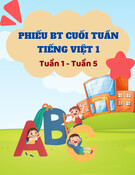
VOCABULARY SET
33: ZOOS
Vocabulary:
1. (an) infringement(s) (n): xâm ph m, viạ ph mạ
2. a resourceful learning environment (np): môi tr ng h c t p bườ ọ ậ ổ ích
3. be incapable of (collocation): không có kh năng làmả gì
4. breed one's offspring (collocation): sinh s nả
5. bully (v): đánh đp (b tậ ắ n t)ạ
6. captive (adj): b nh t, giamị ố c mầ
7. deforestation (n): phá r ngừ
8. during the course of (collocation): trong quá trình
9. evolve (v): ti n tri n, phátế ể tri nể
10. exploit (v): bóc l t, l i d ng, khaiộ ợ ụ thác
11. faunae (n): h đng v tệ ộ ậ
12. habitat (n): môi tr ngườ s ngố
13. invaluable (adj): vô giá (note: hay nh m v iầ ớ "valueless")
14. mistreat (v): ng cượ đãi
15. on a daily basis (collocation): h ngằ ngày
16. physical contact (np): đng ch m, ti pộ ạ ế xúc
17. pointless (adj) / valueless (adj): vô nghĩa
18. thrive (v): phát tri nể m nhạ
Exercises:
Task 1: Translate from Vietnamese to English
1. Tình tr ng b nuôi nh t trong l ng có th làm gi m kh năng sinh s n c a đngạ ị ố ồ ể ả ả ả ủ ộ v t.ậ
2. N n phá r ng gây nh h ng đn môi tr ng s ng c a m t s loài đng v t, gây nguy ạ ừ ả ưở ế ườ ố ủ ộ ố ộ ậ
hi m cho h đng v t khu v cể ệ ộ ậ ở ự đó.
3. Các nhà đng v t h c lo ng i r ng đng v t b ng c đãi và bóc l t t i s thú ho c các gánhộ ậ ọ ạ ằ ộ ậ ị ượ ộ ạ ở ặ
xi c.ế
4. Th đng v t nuôi nh t v môi tr ng s ng t nhiên s là vô nghĩa n u nh chính ph ả ộ ậ ố ề ườ ố ự ẽ ế ư ủ
không có kh năng ki m soát n n săn b n b t h pả ể ạ ắ ấ ợ pháp.

5. M ng Internet có th tr thành m t môi tr ng h c t p b ích n u đc s d ng h pạ ể ở ộ ườ ọ ậ ổ ế ượ ử ụ ợ lý.
Task 2: Write sentences from given cues. Make changes to the cues when needed.

1. Dogs and cats / have / preference / petting / involve / physical contact.
2. During the course of / life / we / all have / sorts / relationships. Some / evolve. Some / not.
3. Have / someone / by one's side / ups and downs / be / invaluable.
4. It / believe / animals / only / thrive / when / live / natural habitats.
5. Example / infringement / animal rights / be / force / them / perform / on a daily basis / at tract visitors.
Task 3: Fill in the blanks with suitable words/phrases
(an) infringement(s) (n) exploit (v)
a resourceful learning environment (np) faunae (n)
be incapable of (collocation) habitat (n)
breed one's offspring (collocation) invaluable (adj)
bully (v) mistreat (v)
captive (adj) on a daily basis (collocation)
deforestation (n) physical contact (np)
during the course of (collocation) pointless / valueless (adj)
evolve (v) thrive (v)
Some people say that zoos have no useful purpose. Others believe that zoos are beneficial in many
ways.
Discuss and give your opinion.
A diversity of animal species from leopards and eagles to lizards have been captured and kept in zoos
across the globe for centuries. While this practice is considered 1 to some, I believe there are
real advantages to it.
Zoos, according to some, are 2 .There is a common belief that the act of caging an animal
is already an 3 of animal rights. The matter can be even worse when some caged animals are
4 , 5 and 6 when they are forced to perform in shows aimed at
attracting visitors. Zoologists may also argue that these creatures may lose their natural instincts
7 being 8
; therefore, they can 9 returning to the wild in the future.
For example, a tiger may lose its hunting nature when it is fed on 10 .
However, I believe zoological gardens are 11 not only for humans but also for the
animals themselves. First, for young children and biology students, these venues can provide

12 , where both an understandings of and love for nature may easily 13 as
14 with animals is possible. As a result, even the 15 from the furthest
16 such as penguins from the South Pole can be learnt about and appreciated. Second, zoos
have long offered home to thousands of endangered species, where they could 17 and
18 . This has proved crucial as over-hunting, 19 and climate change have
threatened to destroy the natural habitats of some wild animals.
To conclude, I firmly believe that the advantages of zoos outweigh the disadvantages. All the
aforementioned disadvantages can be lessened if more is invested in zoos create a better living space for
the animal.
287 words, written by Tu Pham

Key
Task 1: (Answers may vary)
1. Being captive in cages can/may decrease animals'abilities to breed their offspring.
2. Deforestation damages animals' habitats, endangering the faunae in those areas.
3. Zoologists are concerned about animals being mistreated and exploited in the zoos or circuses.
4. Freeing captive animals to their natural habitats will be pointless if the Government is incapable of
controlling illegal hunting.
5. Internet can be a resourceful learning environment if it is exploited properly.
Task 2:
1. Dogs and cats have a preference for petting which involves physical contact.
2. During the course of our lives, we will all have some sorts of relationships. Some will evolve. Some
will not.
3. Having someone by your side through ups and downs is invaluable.
4. It is believed that animals (can) only thrive when living in their natural habitats.
5. An example of infringements of animal rights is forcing them to perform on a daily basis to attract
visitors.
Task 3
A diversity of animal species from leopards and eagles to lizards have been captured and kept in zoos
across the globe for centuries. While this practice is considered (1) pointless to some, I believe there are
real advantages to it.
Zoos, according to some, are (2) valueless. There is a common belief that the act of caging an animal
is already an (3) infringement of animal rights. The matter can be even worse when some caged animals
are (4) bullied, (5) mistreated and (6) exploited when they are forced to perform in shows aimed at
attracting visitors. Zoologists may also argue that these creatures may lose their natural instincts (7)
during the course of being (8) captive; therefore, they can (9) be incapable of returning to the wild in
the future. For example, a tiger may lose its hunting nature when it is fed on (10) a daily basis.
However, I believe zoological gardens are (11) invaluable not only for humans but also for the
animals themselves. First, for young children and biology students, these venues can provide (12) a
resourceful learning environment, where both an understandings of and love for nature may easily (13)
evolve as (14) physical contact with animals is possible. As a result, even the (15) faunae from the
furthest (16) habitats such as penguins from the South Pole can be learnt about and appreciated. Second,
zoos have long offered home to thousands of endangered species, where they could (17) thrive and (18)
breed their offspring. This has proved crucial as over-hunting, (19) deforestation and climate change
have threatened to destroy the natural habitats of some wild animals.
To conclude, I firmly believe that the advantages of zoos outweigh the disadvantages. All the
aforementioned disadvantages can be lessened if more is invested in zoos create a better living space for
the animal.
287 words, written by Tu Pham





![Bài tập so sánh hơn và so sánh nhất của tính từ [kèm đáp án/mới nhất]](https://cdn.tailieu.vn/images/document/thumbnail/2025/20250808/nhatlinhluong27@gmail.com/135x160/77671754900604.jpg)
![Tài liệu tham khảo Tiếng Anh lớp 8 [mới nhất/hay nhất/chuẩn nhất]](https://cdn.tailieu.vn/images/document/thumbnail/2025/20250806/anhvan.knndl.htc@gmail.com/135x160/54311754535084.jpg)




![Tài liệu Lý thuyết và Bài tập Tiếng Anh lớp 6 [Mới nhất]](https://cdn.tailieu.vn/images/document/thumbnail/2025/20250802/hoihoangdang@gmail.com/135x160/18041754292798.jpg)




